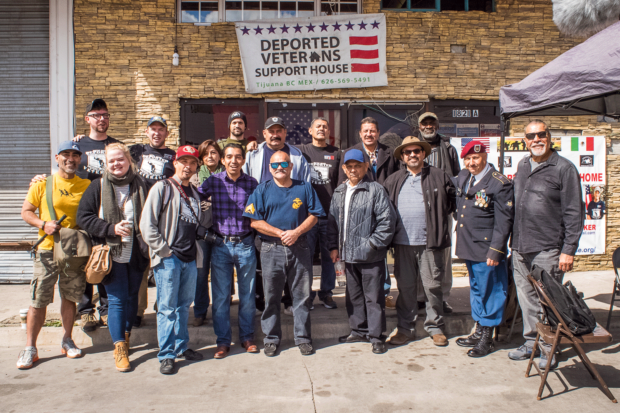
By Rico Franco
Imagine sitting at the San Ysidro, Mexico, border crossing peering over the horizon. One side is Mexico. One side is California. There is a constant stream of cars and people on foot easily crossing back and forth, except for a growing brotherhood of deported U.S. veterans.
The terms deported and veteran seem to negate each other. Who would deport a veteran? The U.S. Government has been doing so since the Vietnam war. Currently, President Donald Trump’s new regulations make it more difficult by extending the waiting period for military green-card holders.
This group is mostly Mexican nationals who served in the U.S. military as a pathway to citizenship. The membership is widespread and includes Canadians and South Africans. Regardless of their heritage, they all took the same oath and served wearing the American flag on their right shoulder as they took up arms to protect our freedoms.
Mario De La Cruz served in the Army National Guard Field Artillery Unit when he left his home in Tulare. Jose Cardenas was brought to America by his parents only to be drafted into the Vietnam war. He served in the Army Airborne, but the government says he has no records to prove his citizenship. Alejandro Murrillo-Bernal saw combat in both Desert Shield and Desert Storm with the U.S. Navy. He is not able to receive treatment for his post-traumatic stress syndrome (PTSD) in Tijuana. This is just a small sample of the stories you will encounter in San Ysidro.
They meet regularly to bolster each other as a unit and wait for change. Their hope lies in H.R. 1405, which seeks to permit eligible deported noncitizen veterans to enter the United States and noncitizen veterans in the United States to adjust their status to a noncitizen lawfully admitted for permanent residence, canceling the removal of eligible noncitizen veterans and allowing them to adjust their status.
It seems like the honorable thing to do given that these veterans risked injury and death. However, change is never easy. H.R. 1405 has 62 co-sponsors all of whom are Democrats. There is not one Republican to be found on the issue of deported veterans.
I noticed their logo bears an upside down American flag, which confused me. I learned that flying the American flag upside down is an officially recognized signal of distress in times of extreme danger to life or property. How appropriate.
These U.S. deported veterans are engaged in political combat to obtain Veterans Administration benefits they were promised by our federal government. A warm sense of shame washed over me as I pondered how this could happen in America.
If a service member takes the military oath swearing allegiance to the Constitution, then as chair of the Veterans Caucus Ad Hoc Committee on Deported Veterans, I will fight to restore judicial discretion for their pathway to citizenship. The federal government has failed these brave service members. They served our country only to be forced to leave. They were decorated and deported.

Alejandro Murillo-Bernal looked at me and asked, “What is more American than a U.S. soldier?” I was hard pressed to form an answer. How would you answer that question?
“The military trained us to fight, not to quit,” Murillo-Bernal explains, “so we will fight until we get back home.”
If I were a betting man, I would put my money on the deported veterans. When a veteran has a clear mission, it will be accomplished regardless of the hurdles. Can I get a “hoo-RAW”?
*****
Rico Franco xxx.
